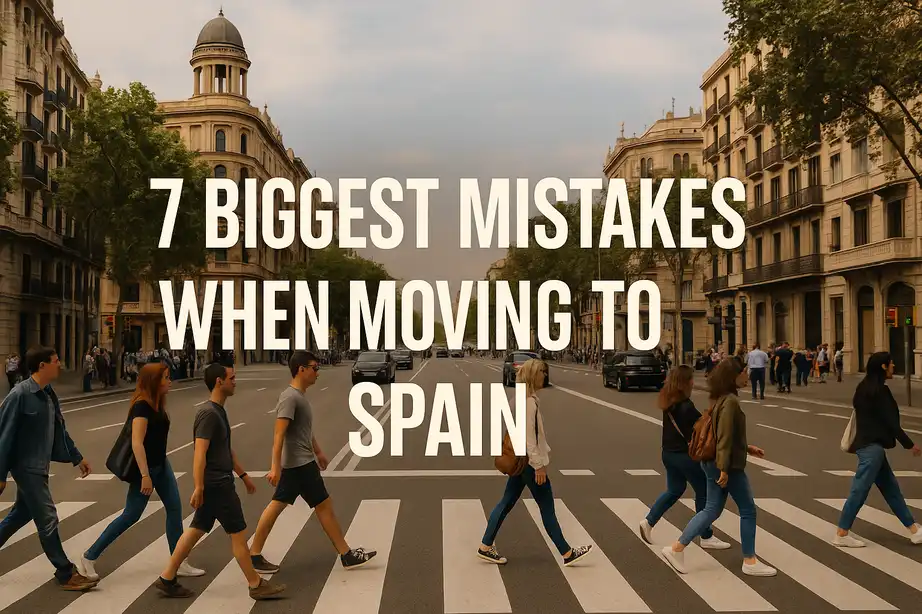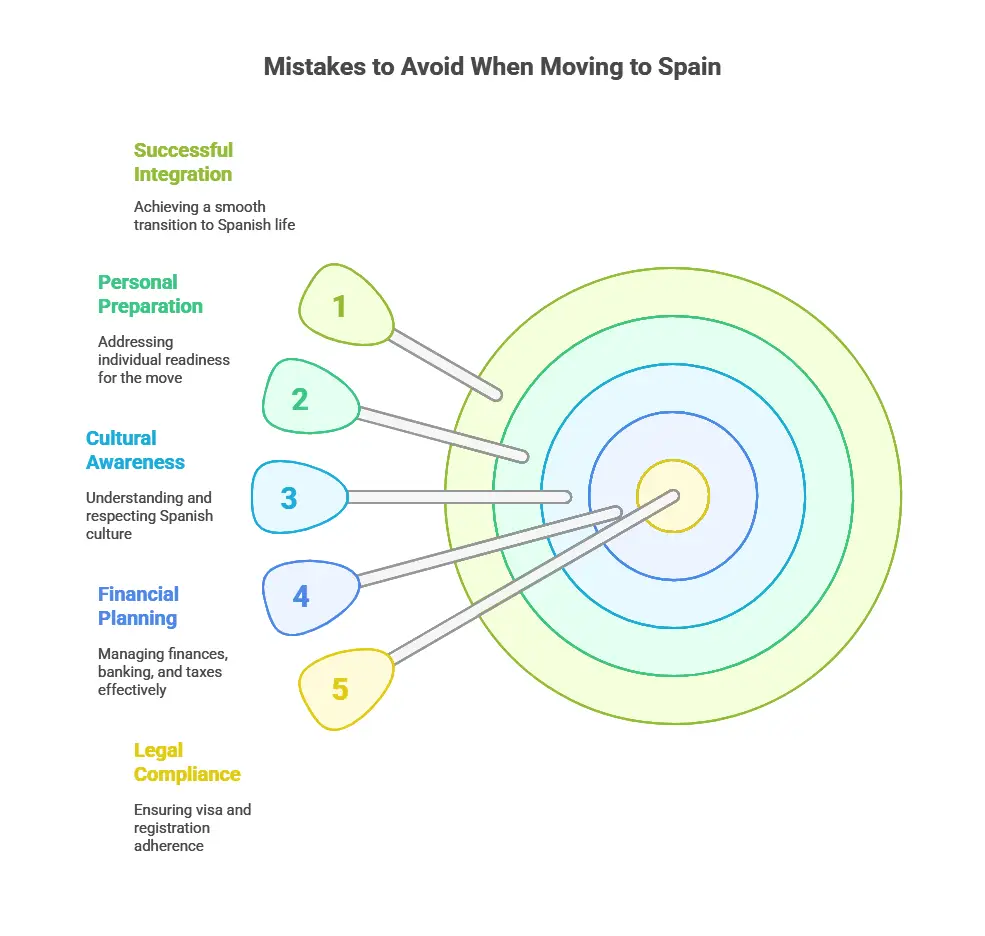7 Biggest Mistakes When Moving to Spain (and How You Can Avoid Them)

Moving to Spain is exciting, but the biggest mistakes when moving to Spain are often completely avoidable.Many expats make the same avoidable mistakes that can cause stress, delays, or even legal trouble. This guide outlines the most common mistakes and how to avoid them so you can enjoy your new life in Spain with confidence.
Key Takeaways
- Always research before applying to visas - bring original and legalized documents.
- Make an effort to learn Spanish or regional languages - it is necessary and makes a huge difference.
- Appointments and paperwork take time in Spain, research and early preparation are a must.
- Each Region and City in Spain can offer something unique - Choose your city based on lifestyle, climate, and budget.
- Legal, financial and tax planning is key, Spanish rules differ from those in other countries.
- To truly enjoy life in Spain, make an effort to integrate and learn how things work locally.
Get your personalized relocation checklist, step-by-step guidance, and access to our complete immigration app.
1. 🛂 Not Researching Your Visa and Residency Requirements
Spain has various visa types and requirements depending on your nationality and situation. One of the most common mistakes is assuming you can simply arrive and sort it out later. Failing to research or apply for the correct visa in advance can delay your move - or worse, get you denied entry. Always check the specific documentation needed for your case, such as the Non-Lucrative Visa (NLV), Digital Nomad Visa (DNV), or EU Family Member Residence Card.
Also, don't forget to bring original and legalized documents like your birth certificate, marriage license, family book, birth certificates and academic records (depending on the application requirements). These are often needed for visa validation, TIE application, or school registration and can be difficult to obtain from abroad. Bring two notarised copies of each document, Spanish consulates now keep one for digitalisation (2024 regulation).
2. 🗣 Assuming Everyone Speaks English
While English is spoken by many in major cities and tourist areas, daily life in Spain still relies heavily on Spanish, or even Catalan, Galician, or Basque depending on the region. Struggling to communicate at appointments, banks, or with neighbors can be frustrating. It helps to learn basic Spanish before your move, and consider enrolling in language classes soon after arriving to feel more integrated and confident - it will make your life and integration so much easier.
Free apps like DuoLingo get you A2 level; municipal Escuelas Oficiales de Idiomas offer subsidised courses from €70/term.
3. 🧾 Underestimating Bureaucracy
From getting your NIE to registering your address (empadronamiento) and setting up healthcare, Spain involves a lot of paperwork. Many processes can be done online but still require **advance appointments (citas previas)**which can be hard to get and may require long wait times. Don't assume things will work like in your home country.
Doing the proper research and preparing early can save you a ton of frustration.
4. 🌆 Choosing the Wrong City for Your Lifestyle
Spain is incredibly diverse, each city is special and unique and what works for one person may not work for another. Some regions are hot and dry, others rainy or cold. Some cities are fast-paced though expensive (like Madrid or Barcelona), while others are quieter and more affordable (like Valencia, Granada, or Lugo).
Moving to the wrong area could make your experience harder than it needs to be. Think about climate, pace of life, cost of living, language, and community before choosing your destination.
5. 🏠 Delaying Empadronamiento and Legal Registration
Empadronamiento is your official registration with the local municipality and it's required for most other processes like getting your TIE (residency) card, public healthcare, or enrolling kids in school. Some newcomers delay it because they're in temporary housing or unsure of the process, but doing it early is crucial.
Keep in mind that most public services and some utility companies or landlords require a local bank account (with a Spanish IBAN). Without it, you may face delays or rejections when setting up essential services or direct debits. From Jan 2025, many ayuntamientos accept digital lease affidavits, cutting wait times by 30 %.
6. 💶 Under-Budgeting Spain’s True Cost of Living and Not Planning Finances Or Taxes Properly
Spain has different tax laws than many other countries, and not understanding them can lead to penalties or surprise bills. You may become a tax resident sooner than expected (usually after 183 days/year), and worldwide income may need to be declared. It's important to research as this could also help you with understanding applicable deductions and special aids, and ultimately help you save a lot of money - and I mean, a lot (e.g. Beckham Law, BECAs, and many more...)!
Also, moving too much or too little from abroad can be a financial mistake - shipping full containers is costly, while leaving behind essential documents may delay critical registrations.
7. 🤝 Not Integrating Into Spanish Life
Spain has a strong social culture, and integrating with locals through language, community events, or even neighborhood WhatsApp groups, can make your life more enjoyable. Many expats can miss out on the full experience.
Many newcomers also delay learning how daily life works, including rules about driving. If you're from outside the EU, you may only be allowed to drive for 6 months before needing to exchange your license or retake a driving test. Failing to act in time can lead to fines or issues with insurance coverage, so make sure to start preparing early for the driving theoretical and practical exams.

Get your personalized relocation checklist, step-by-step guidance, and access to our complete immigration app.
Frequently Asked Questions

Gerard B.
An expat who's done it, so you don't have to!
After spending years in Spain and thousands of euros on lawyers, tax advisors, and residency applications, only to realize that doing it yourself is often easier, cheaper, and just as effective. Gerard is an expat on a mission to help others avoid the same costly mistakes. By creating LiveLoveSpain, Gerard aims to share first-hand experiences, practical tips, and plenty of "Why didn't anyone tell me this?!" moments. Whether it's filing taxes, understanding visas, or just mastering the art of the sobremesa, he's here to help fellow expats integrate seamlessly without breaking the bank.